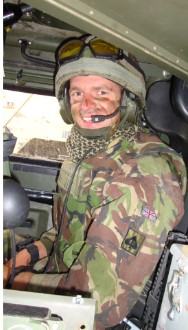
Paul Bedford served in the RLC for 9 years, completing his service as Captain in 2018. During his service, he was a Troop Commander, deploying on operations in the Middle East and responsible for a troop of 35 soldiers, a Deployments Officer, responsible for resourcing, planning and management of personnel and equipment for UK and overseas routine and contingency logistic operations and a Training Officer, delivering military logistic training to officers after leaving the Royal Military Academy Sandhurst (RMAS) and supporting NATO partners on military logistic operations.
During his service, Paul conducted training at the RMAS where all officers in the British Army are trained to take on the responsibility of leading. During training, all officer cadets learn to live by the academy’s motto ‘Serve to Lead’ and other Nations choose to send their personnel to RMAS for Officer training because it is recognised as a world-leading military training academy.
He has since discovered that this training can be applied to many other walks of life, whether that is working with his subordinates to help get the best out of them, finding himself involved in situations where he has had to apply a delicate touch to get the right outcome or working with senior people within a business.
Paul’s current role is Senior Logistics Manager for HS2 joint venture Eiffage Kier Ferrovial Bam (EKFB) which he secured through BuildForce. He spent a lot of time during his transition with other large logistic focussed organisations such as Amazon, DHL and Royal Mail to understand the best fit for his skill set and where best he could utilise his logistics background. He was introduced to BuildForce via a former military boss and later connected to a BuildForce mentor who explained the parallels between construction and the military and where his skills would be best suited; this significantly broadened his career options. Through the BuildForce wider network, he was introduced to one of their founding partners at EKFB which led to the role he is in today.
Networking was the key driver for Paul during his transition to ‘civvy street’, developing relationships but also understanding what his true value was. Uncertainty was his biggest challenge, making the decision to leave the Army wasn’t easy and having to provide 12 months’ notice is very much a leap of faith with an uncertain future. However, staying strong and understanding his worth was key to securing the right role within a business he felt welcomed and at home.
The skills you learn in the military are excellent and stay with you for life. Having regularly delivered logistic supports across significant distances, the EKFB logistics team are bringing in lessons learnt from military expertise that has been proven in the most arduous circumstances around the world to deliver efficiencies to the project and to help bring in a new chapter of managing logistics in construction.
In his current role, Paul oversees the route wide logistics; responsible for bringing together the logistic strategy to provide benefits and efficiencies to the project and the local communities. No two days are the same, from managing teams split across multiple locations, through to providing reactive and planned support to the project; the role of anybody in logistics is very much ensuring the project doesn’t stop. For example, Paul could be in a meeting discussing a multi-million pound contract setup and the planning schedule to ensure the correct capability is on the ground when required, and the next he could be providing reassurance to the local communities, explaining what EKFB is doing to help reduce road risk.
Paul’s advice to those leaving the military, seeking a new career in construction is to focus on what you want to do, where your skills lie and what will give you that job satisfaction. Whether it’s working on the ‘coal face’ constructing, or whether it’s providing a support function in procurement, within the Health & Safety Team or working to provide Environmental oversight; construction has far more opportunities than what many people believe it has.
When asked to describe an ex-military person to a Construction HR manager, Paul’s reply was:
“All ex-military people, regardless of service have their service’s Core Values engrained in them. For example, the Army’s Core Values are:
The military is a way of life. What it stands for and the way ex-military personnel conduct themselves continues long after they hang up their boots.”